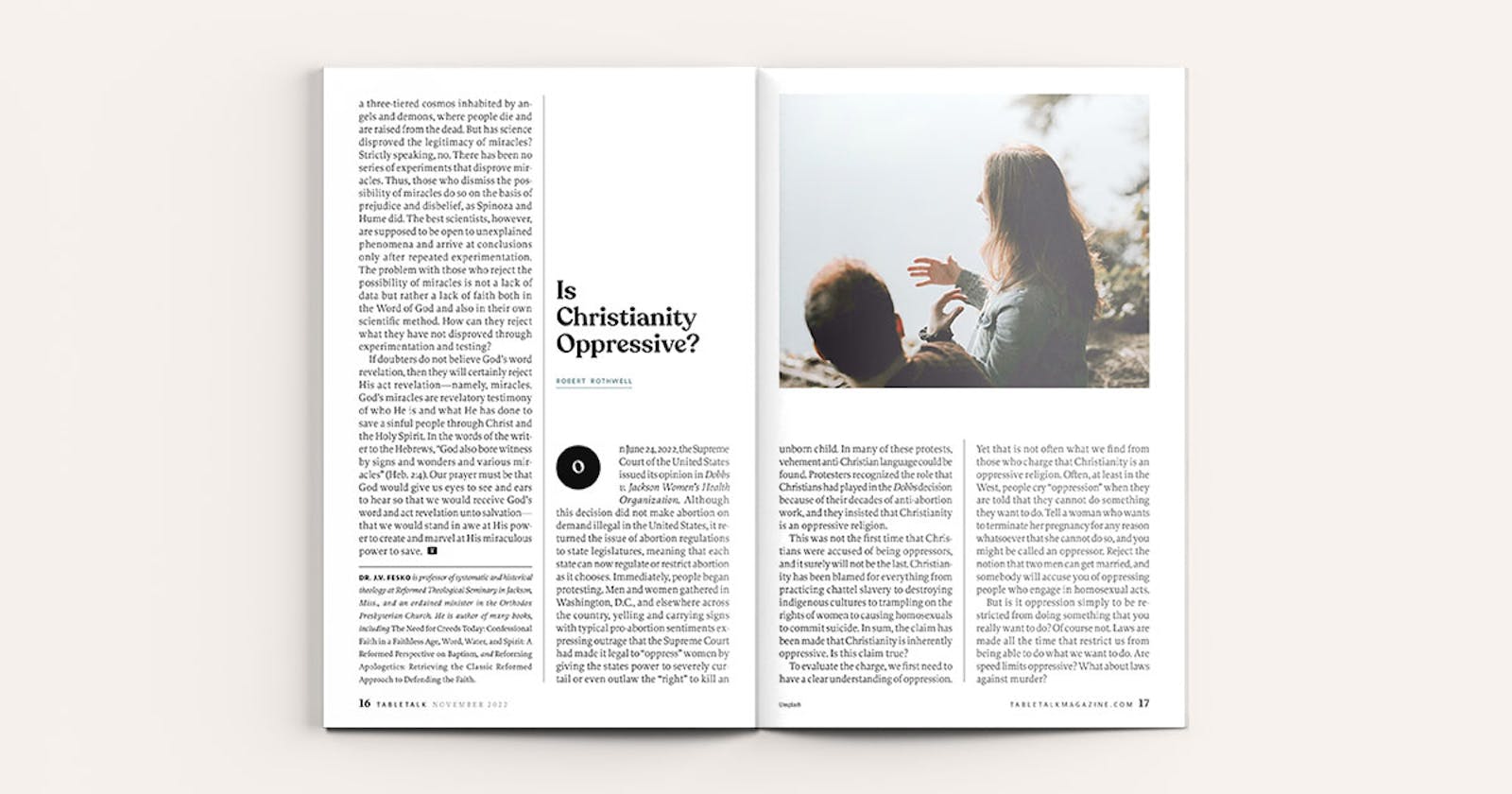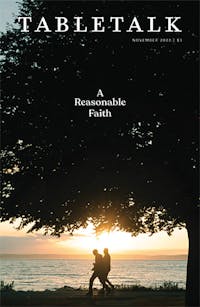
Request your free, three-month trial to Tabletalk magazine. You’ll receive the print issue monthly and gain immediate digital access to decades of archives. This trial is risk-free. No credit card required.
Try Tabletalk NowAlready receive Tabletalk magazine every month?
Verify your email address to gain unlimited access.
On June 24, 2022, the Supreme Court of the United States issued its opinion in Dobbs v. Jackson Women’s Health Organization. Although this decision did not make abortion on demand illegal in the United States, it returned the issue of abortion regulations to state legislatures, meaning that each state can now regulate or restrict abortion as it chooses. Immediately, people began protesting. Men and women gathered in Washington, D.C., and elsewhere across the country, yelling and carrying signs with typical pro-abortion sentiments expressing outrage that the Supreme Court had made it legal to “oppress” women by giving the states power to severely curtail or even outlaw the “right” to kill an unborn child. In many of these protests, vehement anti-Christian language could be found. Protesters recognized the role that Christians had played in the Dobbs decision because of their decades of anti-abortion work, and they insisted that Christianity is an oppressive religion.
This was not the first time that Christians were accused of being oppressors, and it surely will not be the last. Christianity has been blamed for everything from practicing chattel slavery to destroying indigenous cultures to trampling on the rights of women to causing homosexuals to commit suicide. In sum, the claim has been made that Christianity is inherently oppressive. Is this claim true?
To evaluate the charge, we first need to have a clear understanding of oppression. Yet that is not often what we find from those who charge that Christianity is an oppressive religion. Often, at least in the West, people cry “oppression” when they are told that they cannot do something they want to do. Tell a woman who wants to terminate her pregnancy for any reason whatsoever that she cannot do so, and you might be called an oppressor. Reject the notion that two men can get married, and somebody will accuse you of oppressing people who engage in homosexual acts.
But is it oppression simply to be restricted from doing something that you really want to do? Of course not. Laws are made all the time that restrict us from being able to do what we want to do. Are speed limits oppressive? What about laws against murder?
Oppression cannot be conceived of merely as a restriction on something we might want to do. It is, rather, an offense against justice and the humane treatment of others, but who gets to define justice and humane treatment? Ultimately, it is God, who defines justice and kindness in His moral law, which is revealed in the conscience and given to us in Scripture. Restricting abortion on demand or aberrant definitions of marriage is not oppressive, and the reason is that God’s law says that it is cruel and unjust to take an innocent life and harmful to children and others to allow for the expression of sexual immorality. Those who make accusations of oppression but do not heed the law of God have no real grounds on which to make the charge. When people accuse Christians of oppression, it is right for us to demand that they define oppression and then to point them to the law of God as the only thing that can define oppression for all people.
As we look at charges that Christianity is oppressive, we will find that many of them are wholly illegitimate, based on definitions of oppression not sanctioned by God’s Word. Sadly, however, if we are honest with history, we will find that some accusations of oppression have more force. It is true that some people who profess the Christian faith have been guilty of what is rightly called oppression. For example, some professing Christians were involved in chattel slavery, wherein men and women were kidnapped, transported as cargo in unsafe and unsanitary conditions, separated from their children, and made to work in the most arduous of labors with little hope of ever escaping slavery. The fact that some slave masters treated their slaves better than others does not take away from the oppressive nature of the institution. Some professing Christians have been racists and participated in acts of cruelty against people who do not look like them. Some professing Christians have even oppressed their own family members through physical, verbal, emotional, or sexual abuse. Because we follow Jesus, the very incarnation of truth (John 14:6), we should be honest about the failures of some professing Christians throughout history.
Nevertheless, the failures of many who claim the name of Christ do not make Christianity itself an oppressive faith. First, if the Christian faith is true, it is no surprise that its adherents do not always live up to its ideals. The Bible does, after all, teach the doctrine of original sin, which means that all people—including Christians—have a fallen nature to deal with. Those who come to faith in Christ do not at conversion immediately become perfect, unable to mistreat anyone. Scripture is honest that believers do fail. David, one of the holiest old covenant believers, stole the wife of Uriah and had him killed in battle (2 Sam. 11). What is that but oppression? The diaconate was instituted as a response to the neglect of impoverished Greek widows by the Jerusalem Christians (Acts 6:1–6).
Second, that professing Christians have been involved in oppression means only that those who profess the faith have at times not lived as Christians should. No ecumenical creed or Protestant confession says that it is proper for Christians to oppress others. In fact, Christian teaching on ethics fills innumerable volumes with instruction on how to love one’s neighbor, and the Bible itself forbids the oppression of vulnerable people (e.g., Ex. 22:21; Prov. 14:31). Undoubtedly, many of those who have professed Christ and oppressed others have not been genuine Christians, but there have also surely been true believers who have engaged in oppression. But their bad behavior does not negate what God teaches in His Word—and His Word forbids oppression. As Protestants, we do not believe that anyone will be perfect before he dies or that individuals or even the church will never err. In fact, professing Christians can and should be held to account for sins of oppression according to God’s Word.

Finally, it is appropriate to say a word about the good that Christianity has done. Surely, individual Christians have failed in many ways. Christian teaching in itself, however, has been a powerful force against oppression in our world. There are too many areas to talk about in this short article, so we will choose just a few.
Education. One of the most powerful tools for combating oppression that we have seen in world history is education. A properly educated populace that has been trained in the laws of logic can recognize propaganda and other tools that tyrants use to try to control them. When people learn to read, they can read the Bible for themselves and be shaped by its ethical teaching, which has historically led to things such as the rule of law that offers a check on tyranny when it is actually upheld. When it comes to things such as political freedom, freedom of speech, and other blessings that many of us take for granted, there is a strong correlation between the degree of influence that Christianity, especially Protestantism, has had on a culture and the freedoms that people enjoy. This is no accident. Teach people to read and give them Bibles, and their culture cannot help but be shaped by Scripture. Of course, education can be a force for ill when wicked people take charge of it, but the general point is that so many of our political freedoms are connected to Christian influence on education.
Medicine. Christianity has been a strong force for medical advances and providing medical care. Christians have started hospitals and provided doctors wherever the faith has taken root. The scientific method, which has led to many improvements in medicine, is the fruit of a general Christian worldview that says that the world is intelligible because it was made by an intelligent and personal God. Key figures in the development of the scientific method, such as Francis Bacon, Galileo, and Isaac Newton, while not necessarily orthodox in every aspect of theology, were indebted to a biblical concept of reality that encourages the investigation of the Creator’s creation.
Human rights. There is no philosophical basis for human rights stronger than the Christian teaching that all people are made in the image of God (Gen. 1:26–27). If men and women from every tribe and tongue all bear God’s image, then human beings are equal in dignity, and to mistreat them is really an assault on the Lord, a (futile) attack on God by attacking what most resembles Him in creation. We hear a lot of talk about human rights, but only Christianity provides a sure foundation for them.
Regrettably, professing Christians do not have a perfect track record when it comes to oppression. That fact, however, does not make Christianity oppressive. Biblical Christianity provides the only coherent way to define oppression in the first place, and those who have practiced the faith have been a force for good in the world. May we as Christians continually aim to know and practice biblical truth, knowing that it is the only way that we will ever find true freedom (John 8:32).
